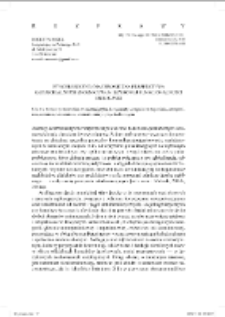- Search in all Repository
- Literature and maps
- Archeology
- Mills database
- Natural sciences
Advanced search
Advanced search
Advanced search
Advanced search
Advanced search

Object
Title: Categorial determinants of diversity of onymic language functionality in a synchronic and diachronic perspective
Publisher:
Place of publishing:
Abstract:
The toponomastic scale of research interests covers the functional specificity of the onomastic components of macrotoponymy, microtoponymy, oronymy and hydronymy as specific language signs, reflecting various natural, economic and social phenomena. The categorical functionality of 01_mrozek.indd 37 2015-11-26 07:32:18ROBERT MRÓZEK38anthroponymy is realised in a three-part systemic set, a name-surname unit, which is occasionally complemented by a pseudonym component or a nickname. All areas of the country have a characteristic distribution of certain forms and provenance of personal names, illustrating also relevant social and ethnic phenomena as well as some background cultural aspects. The basic categorical component of zoonymy is folklore zoonymy, which is complemented by the so-called “urban zoonymy” (urbo zoonymy) and by literary zoonymy. Chrematonymy as a set of names connected with various institutional names, companies, commerce and service facilities, as well as products, accumulates different functions, including persuasion and advertising. The onomastic models of cosmonymy are represented by a set of names from different sources, differentiating their official and local-dialect character.
Relation:
Volume:
Start page:
End page:
Detailed Resource Type:
Format:
Resource Identifier:
10.17651/ONOMAST.59.1 ; oai:rcin.org.pl:57719
Language:
Language of abstract:
Rights:
Terms of use:
Copyright-protected material. May be used within the limits of statutory user freedoms
Digitizing institution:
Institute of Polish Language of the Polish Academy of Sciences
Access:
Object collections:
- Digital Repository of Scientific Institutes > Partners' collections > Institute of Polish Language PAS > Filds of science
- Digital Repository of Scientific Institutes > Partners' collections > Institute of Polish Language PAS > Serials
- Digital Repository of Scientific Institutes > Partners' collections > Institute of Polish Language PAS > Filds of science > Humanities
- Digital Repository of Scientific Institutes > Partners' collections > Institute of Polish Language PAS > Filds of science > Humanities > Linguistics
- Digital Repository of Scientific Institutes > Partners' collections > Institute of Polish Language PAS > Filds of science > Humanities > Linguistics > Onomastics
- Digital Repository of Scientific Institutes > Partners' collections > Institute of Polish Language PAS > Offprint
- Digital Repository of Scientific Institutes > Literature > Journals/Articles
Last modified:
Oct 2, 2020
In our library since:
Jan 23, 2016
Number of object content downloads / hits:
1912
All available object's versions:
https://rcin.org.pl./publication/78072
Show description in RDF format:
Show description in RDFa format:
Show description in OAI-PMH format:
| Edition name | Date |
|---|---|
| Synchroniczno-diachroniczna perspektywa kategorialnych zróżnicowań językowej funkcjonalności onimicznej | Oct 2, 2020 |

 INSTYTUT ARCHEOLOGII I ETNOLOGII POLSKIEJ AKADEMII NAUK
INSTYTUT ARCHEOLOGII I ETNOLOGII POLSKIEJ AKADEMII NAUK
 INSTYTUT BADAŃ LITERACKICH POLSKIEJ AKADEMII NAUK
INSTYTUT BADAŃ LITERACKICH POLSKIEJ AKADEMII NAUK
 INSTYTUT BADAWCZY LEŚNICTWA
INSTYTUT BADAWCZY LEŚNICTWA
 INSTYTUT BIOLOGII DOŚWIADCZALNEJ IM. MARCELEGO NENCKIEGO POLSKIEJ AKADEMII NAUK
INSTYTUT BIOLOGII DOŚWIADCZALNEJ IM. MARCELEGO NENCKIEGO POLSKIEJ AKADEMII NAUK
 INSTYTUT BIOLOGII SSAKÓW POLSKIEJ AKADEMII NAUK
INSTYTUT BIOLOGII SSAKÓW POLSKIEJ AKADEMII NAUK
 INSTYTUT CHEMII FIZYCZNEJ PAN
INSTYTUT CHEMII FIZYCZNEJ PAN
 INSTYTUT CHEMII ORGANICZNEJ PAN
INSTYTUT CHEMII ORGANICZNEJ PAN
 INSTYTUT FILOZOFII I SOCJOLOGII PAN
INSTYTUT FILOZOFII I SOCJOLOGII PAN
 INSTYTUT GEOGRAFII I PRZESTRZENNEGO ZAGOSPODAROWANIA PAN
INSTYTUT GEOGRAFII I PRZESTRZENNEGO ZAGOSPODAROWANIA PAN
 INSTYTUT HISTORII im. TADEUSZA MANTEUFFLA POLSKIEJ AKADEMII NAUK
INSTYTUT HISTORII im. TADEUSZA MANTEUFFLA POLSKIEJ AKADEMII NAUK
 INSTYTUT JĘZYKA POLSKIEGO POLSKIEJ AKADEMII NAUK
INSTYTUT JĘZYKA POLSKIEGO POLSKIEJ AKADEMII NAUK
 INSTYTUT MATEMATYCZNY PAN
INSTYTUT MATEMATYCZNY PAN
 INSTYTUT MEDYCYNY DOŚWIADCZALNEJ I KLINICZNEJ IM.MIROSŁAWA MOSSAKOWSKIEGO POLSKIEJ AKADEMII NAUK
INSTYTUT MEDYCYNY DOŚWIADCZALNEJ I KLINICZNEJ IM.MIROSŁAWA MOSSAKOWSKIEGO POLSKIEJ AKADEMII NAUK
 INSTYTUT PODSTAWOWYCH PROBLEMÓW TECHNIKI PAN
INSTYTUT PODSTAWOWYCH PROBLEMÓW TECHNIKI PAN
 INSTYTUT SLAWISTYKI PAN
INSTYTUT SLAWISTYKI PAN
 SIEĆ BADAWCZA ŁUKASIEWICZ - INSTYTUT TECHNOLOGII MATERIAŁÓW ELEKTRONICZNYCH
SIEĆ BADAWCZA ŁUKASIEWICZ - INSTYTUT TECHNOLOGII MATERIAŁÓW ELEKTRONICZNYCH
 MUZEUM I INSTYTUT ZOOLOGII POLSKIEJ AKADEMII NAUK
MUZEUM I INSTYTUT ZOOLOGII POLSKIEJ AKADEMII NAUK
 INSTYTUT BADAŃ SYSTEMOWYCH PAN
INSTYTUT BADAŃ SYSTEMOWYCH PAN
 INSTYTUT BOTANIKI IM. WŁADYSŁAWA SZAFERA POLSKIEJ AKADEMII NAUK
INSTYTUT BOTANIKI IM. WŁADYSŁAWA SZAFERA POLSKIEJ AKADEMII NAUK


































